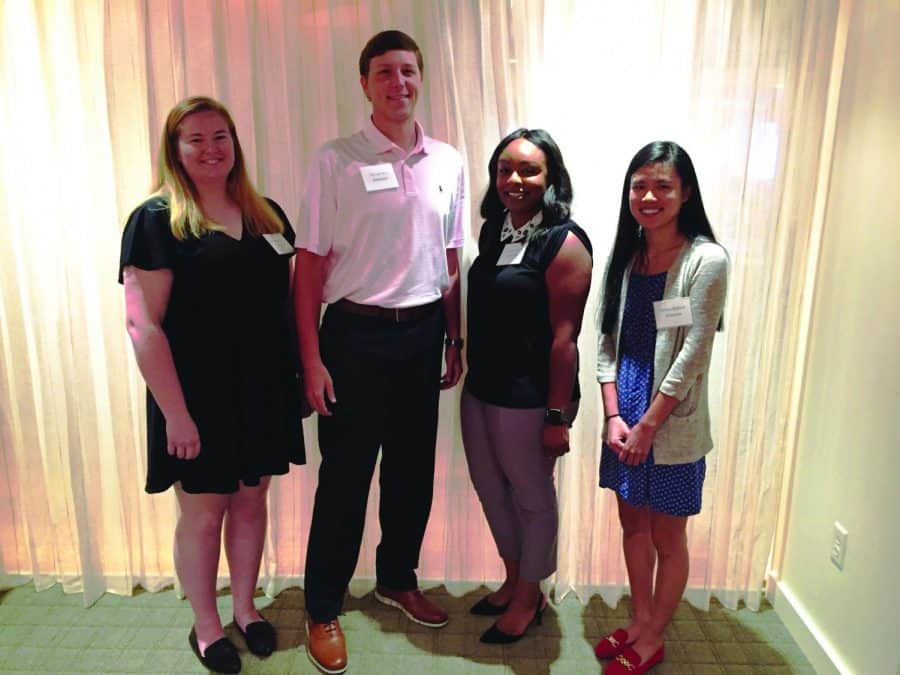Boot camp teaches UA law students secrets to success
August 26, 2019
While some students may shudder at the thought of being picked at random to analyze a case, Aaliyah Locke doesn’t sweat the cold calls.
“Whatever you put into law school, you’re going to get that back,” Locke said.
That’s something she learned this summer at the Susan B. Livingston Boot Camp for Success, an initiative to provide incoming law students from diverse backgrounds the preparation they need for the next three years of their life. Locke and two other University of Alabama law students were at the camp, which was facilitated by Balch & Bingham LLP, a corporate law firm in Birmingham, and featured practicing lawyers such as University of Alabama law professor Brian Fair.
Locke, who recently completed her undergraduate degree at Southern Illinois University, said the experience gave her a sense of what to expect in her first year as well as a way to network with people in her field, and it inspired her to think of advice for students to come.
“If you know nothing about the law or if you come from a long line of attorneys, take every opportunity you have to do any kind of boot camps, any kind of coursework that will prepare you for law school, because it is an experience like I’ve never went through before.”
For Emma Bykerk, an incoming law student who wants to use her degree to help survivors of human trafficking, the boot camp was “a great first step.” For her, it was a move that eased concerns after a three-year stint away from school.
“I think it’s just encouraging in the sense that you know you have people who have your back and who are rooting for you,” she said.
This was Balch & Bingham’s ninth year hosting the boot camp, which involved two days of workshops in early August.
“I think it’s really cool to see a really big, well-known law firm really pouring into the next generation and giving their heart to the next generation and giving a good rep to lawyers when they don’t always have that rep,” Bykerk said.
Bykerk, who came to the camp from Michigan, and Locke, who hails from Illinois, represent the program’s reach. The program represented incoming students from seven law schools across the country: The University of Alabama, Cumberland, Mercer, the University of Florida, Emory, Washington and Lee and Ole Miss.
Whitney Della Torre, a featured speaker and chair of the planning committee at the camp this year, is one of 300 boot camp alumni. As the first in her family to go to college, she said the camp provided her with crucial academic and professional advice. The camp allowed her to ask practicing lawyers exactly why they had decided to be prosecutors or litigators or work outside the courtroom, and she found direction in their answers.
“I was the first of my family to even consider law,” she said. “I think what boot camp provided me was a level of comfort going in, and it took off some of the mystique and some of the fear that I think would have naturally been there.”
This year, Della Torre coordinated panels with the committee to make sure incoming students could receive the same experience she had five years ago. This year students got a crash course on legal writing, learned study skills form a panel of young lawyers and learned to brave what some once dreaded: the cold call.
“We really wanted to get the most out of having a full representation of not only private attorneys, but also in-house attorneys and government attorneys and judges,” she said. “We wanted to have diversity amongst our panelists so that everyone can get a point of view from someone that we related to.”
With its newest class, the UA School of Law has already begun to break records, and, some would say, glass ceilings. For the first time in its nearly 140 years on campus, women make up the majority of the law school’s incoming class. While the class is still largely white, the figure is promising for Locke.
“I do think that says a lot about where the law school is headed,” she said. “We can’t see things in society and expect that to reflect upon an institution within a day, a month, even years. I think the law school, everything they’re doing right now, they’re making the necessary steps.”
Locke credited the Black Law Student Association for being a go-to resource for law students who come from diverse backgrounds. The organization’s mission, she said, is to show students that “they have a place as much as anyone else to be here, and that they matter just as well, and to provide opportunities that otherwise would not be afforded to us.”
For her fellow classmates, Locke has one more token of advice:
“Go in there with an open mind and to be open and willing to accept the change that is inevitable to come, and to not be afraid to embrace any of the hardships that come with it.”








